Related Research Articles

Justice in its broadest sense is the concept that individuals are to be treated in a manner that is equitable and fair.
Due process of law is application by the state of all legal rules and principles pertaining to a case so all legal rights that are owed to a person are respected. Due process balances the power of law of the land and protects the individual person from it. When a government harms a person without following the exact course of the law, this constitutes a due process violation, which offends the rule of law.

The United States attorney general (AG) is the head of the United States Department of Justice (DOJ) and is the chief law enforcement officer of the federal government of the United States. The attorney general serves as the principal advisor to the president of the United States on all legal matters. The attorney general is a statutory member of the Cabinet of the United States.
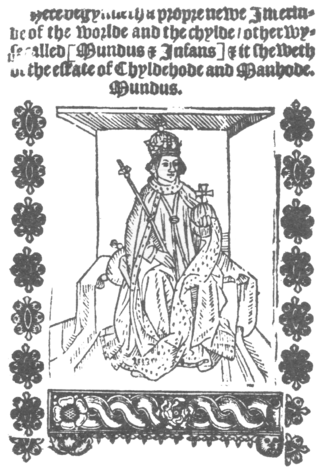
The morality play is a genre of medieval and early Tudor drama. The term is used by scholars of literary and dramatic history to refer to a genre of play texts from the fourteenth through sixteenth centuries that feature personified concepts alongside angels and demons, who are engaged in a struggle to persuade a protagonist who represents a generic human character toward either good or evil. The common story arc of these plays follows "the temptation, fall and redemption of the protagonist".

A judge is a person who presides over court proceedings, either alone or as a part of a panel of judges. In an adversarial system, the judge hears all the witnesses and any other evidence presented by the barristers or solicitors of the case, assesses the credibility and arguments of the parties, and then issues a ruling in the case based on their interpretation of the law and their own personal judgment. A judge is expected to conduct the trial impartially and, typically, in an open court.

The United States Department of Justice (DOJ), also known as the Justice Department, is a federal executive department of the U.S. government that oversees the domestic enforcement of federal laws and the administration of justice. It is equivalent to the justice or interior ministries of other countries. The department is headed by the U.S. attorney general, who reports directly to the president of the United States and is a member of the president's Cabinet. Merrick Garland has served as attorney general since March 2021.
In most common law jurisdictions, the attorney general or attorney-general is the main legal advisor to the government. In some jurisdictions, attorneys general also have executive responsibility for law enforcement, prosecutions or even responsibility for legal affairs generally. In practice, the extent to which the attorney general personally provides legal advice to the government varies between jurisdictions, and even between individual office-holders within the same jurisdiction, often depending on the level and nature of the office-holder's prior legal experience.

The United Kingdom has three distinctly different legal systems, each of which derives from a particular geographical area for a variety of historical reasons: English law, Scots law, Northern Ireland law, and, since 2007, calls for a fourth type, that of purely Welsh law as a result of Welsh devolution, with further calls for a Welsh justice system.

English law is the common law legal system of England and Wales, comprising mainly criminal law and civil law, each branch having its own courts and procedures. The judiciary is independent, and legal principles like fairness, equality before the law, and the right to a fair trial are foundational to the system.
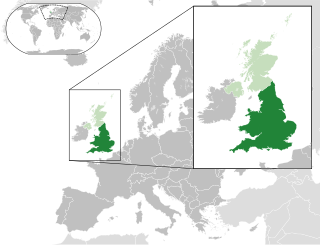
England and Wales is one of the three legal jurisdictions of the United Kingdom. It covers the constituent countries England and Wales and was formed by the Laws in Wales Acts 1535 and 1542. The substantive law of the jurisdiction is English law.
The chief justice is the presiding member of a supreme court in many countries with a justice system based on English common law, such as the High Court of Australia, the Supreme Court of Canada, the Supreme Court of Bangladesh, the Supreme Court of Ghana, the Hong Kong Court of Final Appeal, the Supreme Court of India, the Supreme Court of Ireland, the Supreme Court of Japan, the Supreme Court of Nepal, the Supreme Court of New Zealand, the Supreme Court of Nigeria, the Supreme Court of Pakistan, the Supreme Court of the Philippines, the Supreme Court of Singapore, the Supreme Court of the United States, and provincial or state supreme courts/high courts.
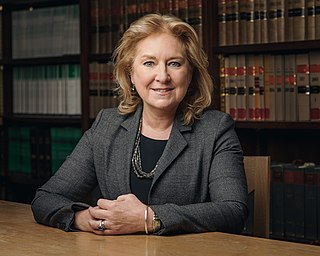
The Lord or Lady Chief Justice of England and Wales is the head of the judiciary of England and Wales and the president of the courts of England and Wales.
Circuit courts are court systems in several common law jurisdictions. It may refer to:
A justice ministry, ministry of justice, or department of justice, is a ministry or other government agency in charge of the administration of justice. The ministry or department is often headed by a minister of justice or a secretary of justice. In some countries, the head of the department may be called the attorney general, for example in the United States. Monaco is an example of a country that does not have a ministry of justice, but rather a Directorate of Judicial Services that oversees the administration of justice. Vatican City, a country under the sovereignty of the Holy See, also does not possess a ministry of justice. Instead, the Governorate of Vatican City State, the legislative body of the Vatican, includes a legal office.

The chief justice of the common pleas was the head of the Court of Common Pleas, also known as the Common Bench, which was the second-highest common law court in the English legal system until 1875, when it, along with the other two common law courts and the equity and probate courts, became part of the High Court of Justice. As such, the chief justice of the Common Pleas was one of the highest judicial officials in England, behind only the lord high chancellor and the lord chief justice of England, who headed the King's Bench.
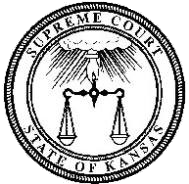
The Kansas Supreme Court is the highest judicial authority in the U.S. state of Kansas. Composed of seven justices, led by Chief Justice Marla Luckert, the court supervises the legal profession, administers the judicial branch, and serves as the state court of last resort in the appeals process.
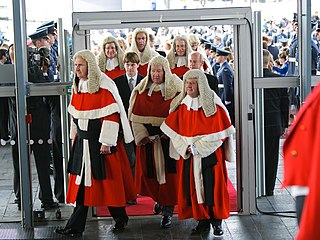
Welsh law is an autonomous part of the English law system composed of legislation made by the Senedd. Wales is part of the legal jurisdiction of England and Wales, one of the three legal jurisdictions of the United Kingdom. However, due to devolution, the law in Wales is increasingly distinct from the law in England, since the Senedd, the devolved parliament of Wales, can legislate on non-reserved matters.

The assizes, or courts of assize, were periodic courts held around England and Wales until 1972, when together with the quarter sessions they were abolished by the Courts Act 1971 and replaced by a single permanent Crown Court. The assizes exercised both civil and criminal jurisdiction, though most of their work was on the criminal side. The assizes heard the most serious cases, most notably those subject to capital punishment or, later, life imprisonment. Other serious cases were dealt with by the quarter sessions, while the more minor offences were dealt with summarily by justices of the peace in petty sessions.
Mister, usually written in its contracted form Mr. or Mr, is a commonly used English honorific for men without a higher honorific, or professional title, or any of various designations of office. The title Mr derived from earlier forms of master, as the equivalent female titles Mrs, Miss, and Ms all derived from earlier forms of mistress. Master is sometimes still used as an honorific for boys and young men.

Pokémon the Movie: Kyurem vs. the Sword of Justice is a 2012 Japanese animated film produced by OLM, Inc. and distributed by Toho. The film was directed by Kunihiko Yuyama and written by Hideki Sonoda. It is the 15th animated installment in the Pokémon film series created by Satoshi Tajiri, Junichi Masuda and Ken Sugimori.
References
- Holdsworth, William Searle (1922). A History of English Law. Vol. 1 (3 ed.). Little, Brown. OCLC 48555551.